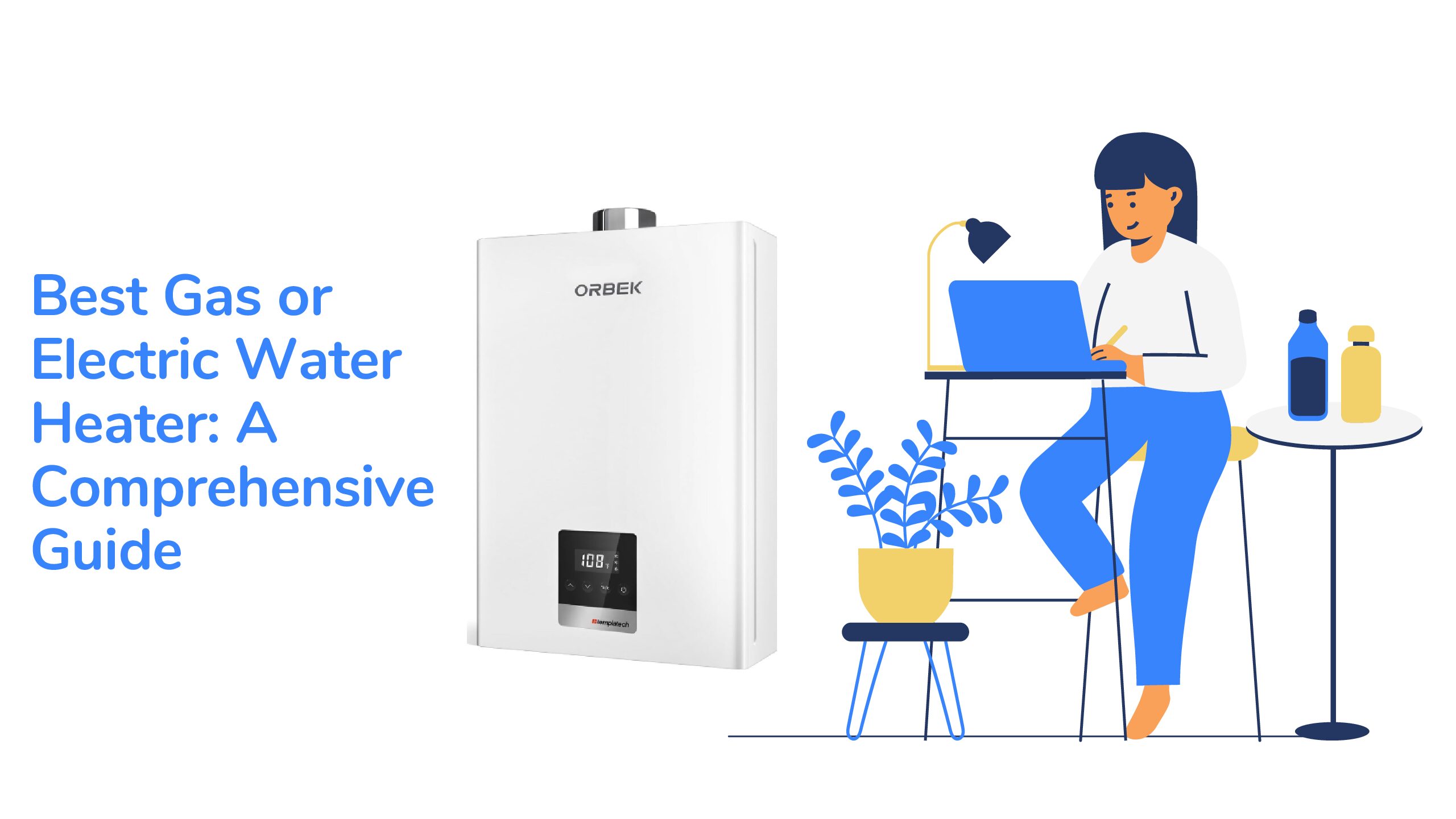Table of Contents
When it comes to choosing a water heater for your home, the debate between gas or electric water heater options is common. Both types have their advantages and disadvantages, making the decision one that depends on your specific needs, budget, and priorities. This comprehensive guide will help you understand the differences and make an informed choice for your household.
Understanding Gas and Electric Water Heaters

Gas Water Heaters
Gas water heaters use natural gas or propane as their energy source. These units are known for their fast heating capabilities and cost-effective operation in areas where gas prices are lower.
- Advantages of Gas Water Heaters:
- Quick heating: Gas models heat water faster than electric ones.
- Lower operating costs: Gas is typically cheaper than electricity in many regions.
- Functionality during power outages: Gas water heaters can operate even during electricity outages.
- Disadvantages of Gas Water Heaters:
- Higher upfront cost: Installation can be pricier due to venting requirements.
- Safety concerns: There is a small risk of gas leaks or carbon monoxide exposure.
- Regular maintenance: Gas models require vent and burner cleaning for optimal performance.
Electric Water Heaters

Electric water heaters use heating elements powered by electricity to warm water. These units are often more affordable upfront and easier to install.
- Advantages of Electric Water Heaters:
- Lower initial cost: Electric models are typically more affordable to purchase and install.
- Compact design: These units take up less space and don’t require venting.
- Safety: There’s no risk of gas leaks or carbon monoxide exposure.
- Disadvantages of Electric Water Heaters:
- Slower heating time: Electric heaters take longer to heat water.
- Higher operating costs: Electricity is often more expensive than gas.
- Dependence on electricity: These units won’t work during a power outage.
Factors to Consider When Choosing Between Gas or Electric Water Heater

- Energy Efficiency
Electric water heaters are generally more energy-efficient since they don’t lose heat through venting, unlike gas models. However, gas heaters often have lower overall operating costs, especially in areas where natural gas is cheaper than electricity. - Installation Costs
Gas water heaters require venting systems, which can increase installation costs. Electric water heaters are simpler to install and are ideal for homes without existing gas lines. - Performance and Hot Water Needs
If you have a large family or high hot water demand, a gas water heater may be the best choice due to its faster heating capabilities. For smaller households with moderate usage, an electric water heater may suffice. - Environmental Impact
Electric water heaters are considered more environmentally friendly if your electricity comes from renewable sources. Gas water heaters, while efficient, produce emissions that can contribute to your carbon footprint. - Maintenance and Longevity
Gas water heaters require more maintenance, including regular cleaning of burners and vent systems. Electric water heaters have fewer components and generally require less upkeep.
Top Brands for Gas or Electric Water Heaters
- Rheem
Rheem offers both gas and electric water heaters known for their durability and efficiency. Their electric models are especially praised for energy savings. - AO Smith
AO Smith is a leading brand offering high-performance gas and electric water heaters with innovative features like smart thermostats. - Bradford White
Bradford White specializes in high-quality gas water heaters with excellent recovery rates and reliability. - Bosch
Bosch produces energy-efficient electric water heaters with compact designs suitable for smaller homes.
Gas vs. Electric: Which Is the Best Choice for You?
The best water heater for your home depends on your priorities:
- Choose a gas water heater if:
- You need fast hot water recovery.
- You live in an area with low natural gas costs.
- Your home already has a gas line installed.
- Choose an electric water heater if:
- You’re looking for a lower upfront cost.
- Energy efficiency is a top priority.
- You want a safer and more compact option.
Conclusion
Choosing the best gas or electric water heater requires weighing factors like energy efficiency, installation costs, performance, and your household’s specific needs. Both options have their strengths, but understanding their pros and cons can guide you to the right decision.
By evaluating your budget, energy preferences, and hot water demands, you’ll find the perfect water heater to keep your household running smoothly. Whether you opt for a gas or electric water heater, investing in a high-quality model will ensure reliable hot water for years to come.
FAQs About Gas or Electric Water Heaters

1. Which is cheaper to operate: a gas or electric water heater?
Gas water heaters are generally cheaper to operate because natural gas tends to be less expensive than electricity in many regions. However, the actual cost depends on local energy prices and your usage habits.
2. Are gas water heaters more energy-efficient than electric ones?
Electric water heaters are more energy-efficient because they don’t lose heat through venting, unlike gas models. However, gas water heaters may be more cost-efficient in areas with low gas prices.
3. Can I install an electric water heater if my home doesn’t have a gas line?
Yes! Electric water heaters don’t require a gas line or venting, making them an excellent choice for homes without existing gas infrastructure.
4. Do gas water heaters work during a power outage?
Yes, gas water heaters can often operate during a power outage because they rely on gas rather than electricity. However, some models with electronic ignition may not work without electricity.
5. How long do gas and electric water heaters last?
Both gas and electric water heaters typically last 8–12 years, depending on the model and how well they are maintained. Electric water heaters may have a slightly longer lifespan because they have fewer components that require regular upkeep.
6. Are gas water heaters safe?
Gas water heaters are safe when properly installed and maintained. Regular inspections are essential to check for gas leaks and ensure proper venting to prevent carbon monoxide buildup.
7. What size water heater do I need for my home?
The size of the water heater depends on your household’s hot water demand. For a family of 2–3, a 30–40-gallon tank is usually sufficient. For larger families of 4–5, consider a 50–60-gallon tank. Tankless models can also be sized based on flow rate needs.
8. Can I switch from a gas water heater to an electric one (or vice versa)?
Yes, but switching between gas and electric water heaters may involve additional costs. For example:
- Converting to a gas water heater may require installing gas lines and venting.
- Switching to an electric water heater may need additional electrical work to handle the required voltage.
9. Which water heater is better for the environment?
Electric water heaters are generally better for the environment if your electricity comes from renewable energy sources. Gas water heaters, while efficient, emit greenhouse gases.
10. Do electric water heaters heat water as quickly as gas models?
No, gas water heaters typically heat water faster because of their higher recovery rate. This makes them ideal for households with high hot water demands.
You may also be interested in this article Best Workout Perfume for Men: Top Scents to Energize Your Routine





